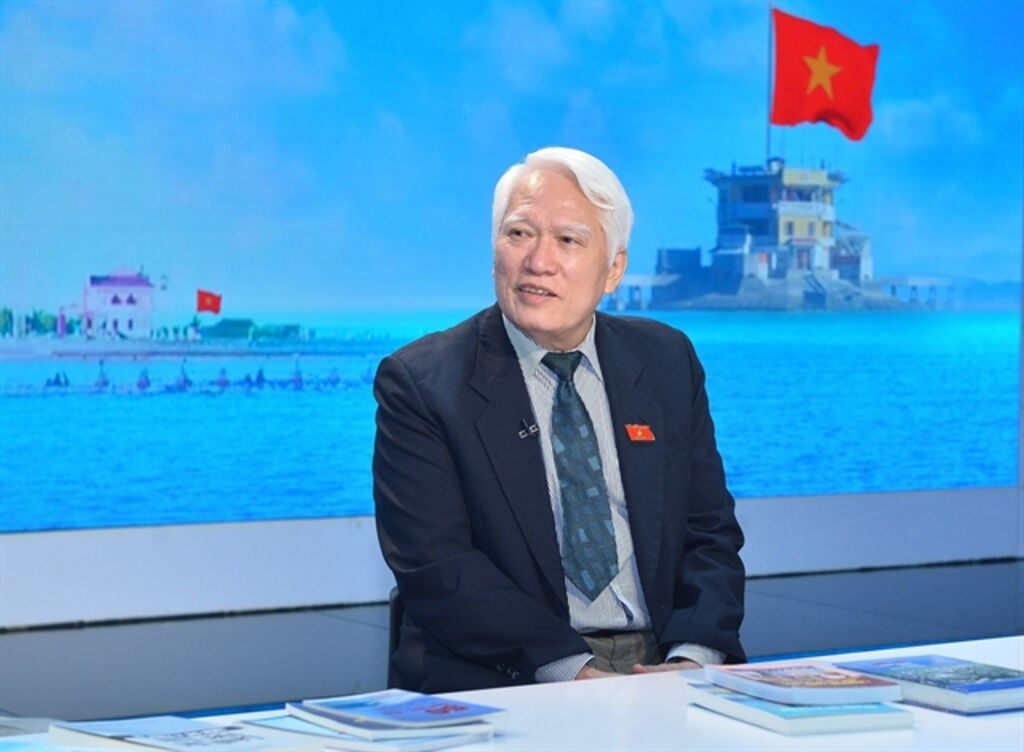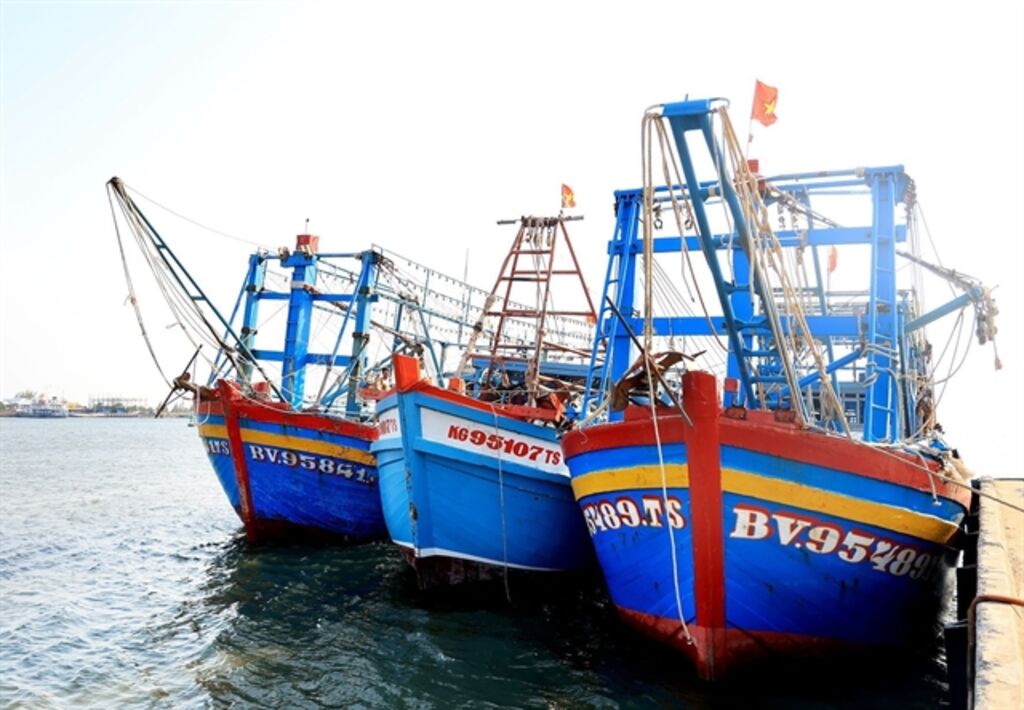 |
| Nguyen Chu Hoi, Permanent Vice Chairman of Vietnam Fishery Association__Photo: VNA |
The removal of the yellow card warning against illegal, unreported, and unregulated (IUU) imposed by the European Commission (EC) is more than just a goal for Vietnam’s seafood industry. This will also be a step towards improving the marine environment for sustainable and responsible fishing practices. Vietnam News Agency spoke with Nguyen Chu Hoi, Permanent Vice Chairman of Vietnam Fishery Association, about this issue.
What are your thoughts on Minister of Agriculture and Rural Development Le Minh Hoan's responses during the 25th session of the National Assembly (NA) Standing Committee when he spoke about the solutions to lift the EC's yellow card?
Solutions for fighting violations of regulations related to (IUU) fishing are a pressing and long-term issue. This has been identified as a primary task for our political system and fishermen in coastal provinces.
Our aim is not only to remove the EC's yellow card but also to build a sustainable and responsible fishing industry. Only then can our fishermen have a prosperous life, our nation become stronger and our seafood industry becomes sustainable. Therefore, this is a matter of great concern to citizens nationwide, making IUU a significant topic during Minister Hoan's parliamentary question and answer sessions.
Hoan prepared his responses and answered this issue with dedication. I believe that after this session, the minister will continue to listen to the opinions of voters and fishermen.
Minister Hoan also expressed a desire to meet with the Vietnam Fishery Association to engage in a dialogue with the officials of the association to further discuss IUU-related issues.
What is your assessment of our fishermen's compliance with the EC's regulations on sustainable seafood harvesting?
IUU is a challenging issue because it stems from the nature of small-scale fishing in our country. The structure of small-scale fishing consists of individual households, where fishing is often passed down from generation to generation. Many of these households still operate on small boats, and their fishing methods are manual and dispersed.
Venturing offshore and clinging to the sea is a risky endeavor for our fishermen, relying on a foundation of professional experience and courage. They operate on small vessels, so changing the fishing habits of our fishermen is a process.
Recently, the EC issued a warning regarding the fishing practices in Vietnam, demanding changes in seafood harvesting methods, including policy reforms. We have introduced 14 criteria to identify IUU in the 2017 Fisheries Law. However, it's essential to emphasize that these criteria are intended for the identification and recognition of IUU, not as legal sanctions. I believe that in the near future, we should focus on further refining these 14 criteria to ensure they become legally enforceable within the law. This will enhance the effectiveness of deterrence measures.
 |
| Fishing vessels are anchored in the coastal area of Ha Tien City in Kien Giang Province__Photo: VNA |
During the Q&A session with Minister Hoan, there were NA deputies who inquired about enhancing the institutional framework and policies for the development of the fisheries sector and the prevention of IUU fishing. In your opinion, what policies are required?
In the 2017 Fisheries Law, which was passed by the NA, there are specific provisions addressing the prohibition of illegal fishing and harvesting. At the local level, there is also a strong commitment to addressing this issue. In his response before the NA Standing Committee, Minister Hoan highlighted solutions, including the need for a new management model for the fisheries sector at the local level.
In my view, regardless of the management model adopted, it cannot succeed without the participation of fishermen, local communities, and the involvement of businesses. Even though our fishing industry is predominantly small-scale, when there are larger vessels and commercial-scale seafood harvesting for export, there still needs to be a role for businesses supporting these activities.
Therefore, we must consider building a community of businesses and fishing communities that are voluntary, self-regulating, and self-adjusting. In such a scenario, associations can provide support, and fishermen can self-regulate their behavior and respond to natural and human-made disasters, all under the oversight of the State. This is how we can effectively address IUU fishing.
Regarding IUU fishing prevention, we are striving to use administrative measures to promptly lift the EC's yellow card to avoid economic losses. I understand that Vietnam's seafood exports to the European market account for approximately 16 per cent. Therefore, we have the right to demand that the EU enhance cooperation with Vietnam in actively resolving this issue, which is mutually beneficial.
They cannot simply make demands without corresponding solutions for us to lift the yellow card for Vietnamese seafood. We are making efforts, but on the other hand, the EU also needs to cooperate with Vietnam.
Furthermore, we need to implement long-term solutions, primarily ensuring that people comply with regulations and do not re-offend. When fishermen face numerous risks at sea, rising fuel costs, and the need to lay off their vessels while transitioning to ensure their livelihoods, it can lead to re-offending.
Marine conservation to preserve the ecosystem is crucial, as it sustains the habitat for seafood. If coral reefs are lost, seafood disappears, and without seafood, there is no fishing industry and there are no fishermen contributing to the country's seafood exports, and it weakens our capability to protect our sovereignty over marine territories.
Therefore, more than ever, fishermen are essential in combating IUU fishing. I believe that we need specific policies to comprehensively address three aspects: fishermen, the fisheries industry, and fishing grounds, all aimed at sustainable and responsible fishing.
In the upcoming period, we must enforce lawful seafood harvesting practices with responsibility. Responsible seafood harvesting means not depleting seafood resources. This is not just the livelihood of an individual, a family, or a nation but also a global and humanitarian issue. In Government meetings, Prime Minister Pham Minh Chinh has emphasized multiple times that compliance with lawful seafood harvesting and the cessation of IUU violations are the keys to a healthy fishing industry, wealth for our fishermen, and elevating our nation's reputation on the international stage.- (VNS/VLLF)









